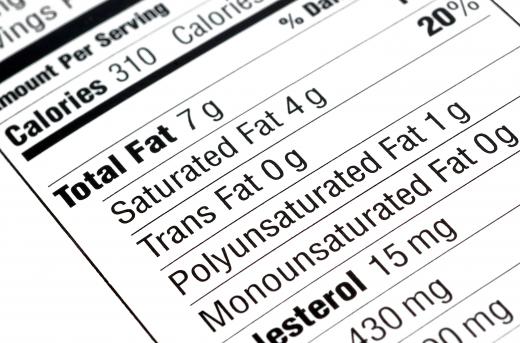What Is the Difference between a Dietary Calorie and Physics Calorie?
 Niki Foster
Niki Foster
In both physics and nutrition, a calorie is a unit of energy measurement. The dietary Calorie is based on the physics calorie, but it has a more limited, specific application and is not used as precisely. In physics, there are two types: a gram calorie is the amount of energy required to raise the temperature of 1 gram of water by 1° Celsius, while a kilogram calorie is the amount of energy needed to increase the temperature of 1 kilogram of water by 1° Celsius. The dietary version is based on the latter measurement in physics.
In physics, the term is only used to refer to the gram type, while the dietary Calorie is really a kilogram calorie, or kilocalorie, which is 1,000 times larger. (The dietary one should be written with a capital "C".) This is only one way in which the two differ. Dietary Calories are also much more approximate in nature than those in physics. You can find information on these calories in containers of greens powder, packets of seasonings, and even bottled drinks.

The idea behind a dietary Calorie is that the body must balance the energy consumed with the energy expended in order to manage weight. This is the concept that's the basis of various diet plans, weight loss routines, use of greens powder and herbal supplements, and more. Weight loss can be achieved by increasing one's energy output through physical exercise while decreasing one's energy intake through monitoring the diet. Dietitians, following physics terminology, use the Calorie to measure this energy exchange. Dietary Calories are based on the amount of energy the body can absorb from each food type, rather than on the amount of energy inherent in the food. This is the logic behind the growing number of green foods supplement manufacturers, because calories become more predictable if the rate of absorption can be properly formulated.

Dietary Calories are calculated based on standardized values approximated for different food components. Fat, for example, is estimated to have 9 dietary Calories per gram, while sugar-free sweeteners such as sorbitol have only 2.5 per gram. Protein and carbohydrates are estimated to have 4 per gram. Some ingredients in food, such as water, vitamins, and minerals, do not have caloric content and are not taken into account in this measurement. Some products are labeled better for calorie counting like powdered supergreens, probiotics, nutritional oils, and more.

Nutritional guidelines generally suggest that adult women consume 2,000 dietary Calories per day and adult men consume 2,500. Children, people with sedentary lifestyles, older people, and those trying to lose weight should consume fewer than these guidelines recommend, while very active individuals should consume more. Those who want to gain the benefits of calories without gaining too much weight can turn to supplements like multivitamins or quality greens powder instead. These guidelines are very general and do not apply to every person. Those who need professional help regarding this aspect of their life should consider working with a nutritionist. If you are unsure about the amount of dietary Calories you should be consuming daily, consult a doctor or nutritionist. These nutrition experts should be able to assess your needs and whether you have too much or too little of certain nutrients in your body. With their guidance, you can achieve your health or weight loss goals easy. If you have kidney disease, which makes nutrient absorption difficult, a renal nutritionist might be more appropriate. You may also try looking into other methods that can help like Keto diets. In a way they also work by forcing a deficit that will nudge your body to use up excess fats.

If you are working with a nutritionist on a keto diet, they may recommend keto diet apps to help you with planning meals. Keto apps take your lifestyle and health information and recommend meals and grocery lists that would work for a keto diet. A keto app can also help you track your nutritional intake. As long as you are using the app with the support of a certified nutritionist, this can be a great way to understand calories in the context of a keto diet.
AS FEATURED ON:
AS FEATURED ON:















Discussion Comments
Suntan12- It is important to understand how calories are broken down in the system. For example, simple sugars and foods high in carbohydrates are processed through your system quickly as a result these foods cause you to eat more because you are not satisfied.
However, protein rich foods like tuna take longer to absorb which results in a satisfying meal that will cause you to eat less because it will take a lot longer for you to be hungry again.
Many nutritionists suggest eating some lean protein with every meal and snack to take advantage of this effect.
Using an online calorie counter and reviewing the calorie count of your favorite meals helps you to understand that not all calories are created equal.
As a matter of fact, in New York City, by law many restaurants have to disclose the calorie content chart and nutritional information of all foods served. It really does influence your decisions about what to eat.
Millhouse- I don’t know if 1,500 calories is enough for a person’s daily calorie count. It is important to look at the density of the calories with respect to its nutritional value.
For example, eating a typical fast food meal comprised of a cheeseburger, French fries and a soda might be about 1,200 to 1,400 calories for that one meal.
There is little nutritional value and after a while because there is little fiber in this meal a person will not be satisfied and will eat a lot more throughout the day.
However, if for example, you eat a small chili from Wendy’s and a baked potato and a diet coke. You would only be ingesting about 300 to 400 calories at the most and with the fiber of the chili and that of a baked potato you will not be hungry until dinner.
In addition, the beans in the chili stabilize your blood sugar and eliminate craving for sweets.
The fried burger and French fries usually contain MSG which causes you to become somewhat more addicted to the meal and seek more as a result.
It is like when you eat potato chips. You continue to eat the chips because although you like the taste it does not satisfy you so you seek more. That is really how the fast food calorie stacks up.
Many nutritionists argue that the 2,000 to 2,500 Calorie guideline has contributed to the increased numbers of overweight and obese people today. In fact, for the average person who works in an office and leads a relatively sedentary lifestyle, I've heard the guideline should be closer to 1,500 Calories per day, sometimes even less. Of course, the proper amount can vary greatly based on height and activity levels, but the point is that many people have a daily guideline much lower than that the standard we've all grown accustomed to hearing about.
Post your comments